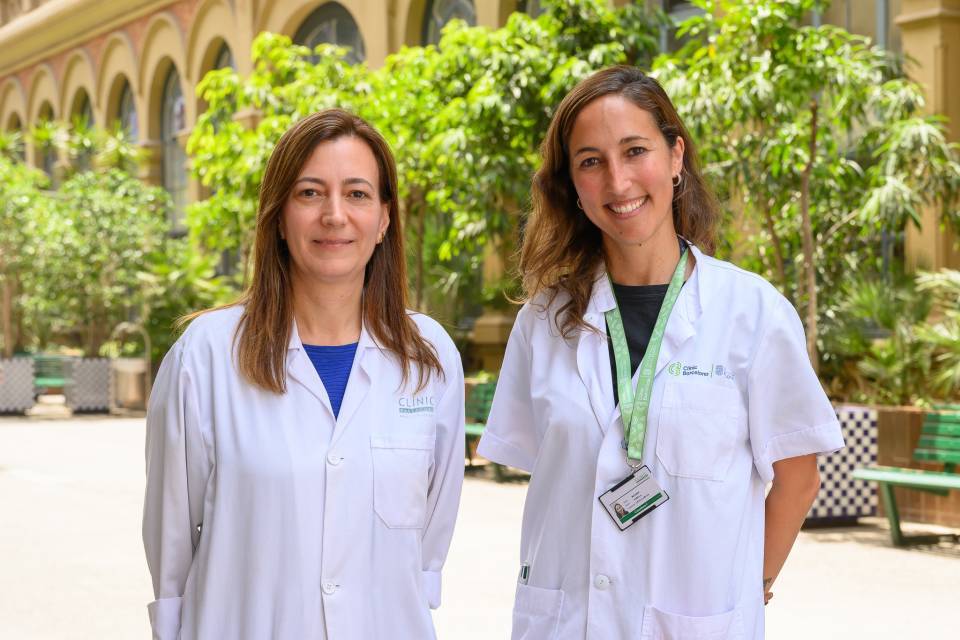- What is it?
- Causes and risk factors
- Symptoms
- Diagnosis and tests
- Treatment
- Living with the disease
- Evolution of the disease
- Research
- Frequently Asked Questions
-
The disease at the Clínic
- Team and structure
Frequently Asked Questions about Autoimmune Hepatitis
There is no specific test recommended for the diagnosis of AIH. The disease is asymptomatic in most cases and diagnosis is established after routine laboratory tests performed for other reasons. Therefore, all patients are advised to have their annual check-up according to their doctor’s recommendations.
AIH is not a hereditary disease. While a genetic predisposition exists, there is no proven increased risk among first-degree relatives. Therefore, there are no specific screening recommendations for people with a positive family history, other than routine blood tests as indicated by their doctor.
A liver biopsy is required before a diagnosis of AIH can be made. At our centre, it is ultrasound-guided and performed percutaneously under local anaesthetic. The entire procedure lasts about 20 minutes and patients remain under observation for 6 hours afterwards. The most common complications are localised pain after the procedure and subcapsular liver bleeding; both of which are managed with conservative measures. Severe bleeding is extremely rare and can be treated endoscopically or surgically if necessary.
Only a small number of AIH patients do not require immediate immunosuppressive therapy. These are patients with mild biochemical abnormalities and low disease activity as shown by a liver biopsy. However, they must undergo regular monitoring and, if liver tests remain abnormal or worsen, treatment should begin immediately.
The most common side effects are after corticosteroid use and include weight gain, acne, facial and peripheral oedema, insomnia, new-onset diabetes, high blood pressure and osteoporosis. To minimise these effects, the corticosteroid dose is reduced as quickly as possible. During corticosteroid treatment, patients should avoid excessive calorie intake by reducing carbohydrates and limit salt intake to prevent swelling and/or hypertension. Bone density should be monitored every two years and specific treatment prescribed if indicated.
Alcohol intake is generally discouraged for all patients with liver disease. Patients with AIH without fibrosis and normal liver biochemistry may consume small amounts of alcohol on special occasions (e.g., a glass of wine once every 3-4 weeks). However, alcohol consumption is strongly discouraged in patients with cirrhosis, as it can lead to decompensated cirrhosis; that is, the development of ascites or hepatic encephalopathy.
Pregnancy is not contraindicated in women with AIH and does not pose specific risks for the mother or foetus. However, if pregnancy is planned, it should be discussed in advance with the specialist to make the necessary adjustments to treatment. In particular, corticosteroids and azathioprine are not contraindicated during pregnancy; however, mycophenolate mofetil has been associated with foetal abnormalities and must be discontinued 3-6 months before conception.
In the postpartum period, women with AIH have a higher risk of disease flare, so close monitoring and temporary increases in doses of immunosuppressants may be required. Women with AIH and liver cirrhosis are at a higher risk of developing cirrhosis-related complications. In these cases, a pregnancy is considered high-risk, so close follow-up by healthcare providers and liver specialists is essential.
Pregnancy is contraindicated in women with AIH and decompensated cirrhosis (with ascites or hepatic encephalopathy).
According to international guidelines, treatment should be continued for at least two years after normalisation of liver biochemistry. After that, treatment withdrawal can be attempted.
However, most patients experience a relapse after discontinuation. In such cases, a low-dose immunosuppressive regimen may be maintained indefinitely.
AIH often coexists with other autoimmune diseases. The most common is Hashimoto’s thyroiditis, while others include diabetes, vitiligo and celiac disease. Therefore, antibody testing for Hashimoto’s thyroiditis and celiac disease is recommended at the time of AIH diagnosis.
About a third of patients are diagnosed with AIH when cirrhosis is already present. Even patients with decompensated cirrhosis may benefit from starting treatment, as liver function can improve and remain stable for long periods. For patients whose disease progresses despite treatment, or for those with decompensated cirrhosis in whom treatment is no longer appropriate, a liver transplant is the only option.
Substantiated information by:


Published: 27 October 2025
Updated: 30 October 2025
Subscribe
Receive the latest updates related to this content.
(*) Mandatory fields
Thank you for subscribing!
If this is the first time you subscribe you will receive a confirmation email, check your inbox
